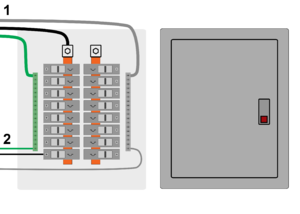Difference between revisions of "Distribution panel"
Jump to navigation
Jump to search
| Line 1: | Line 1: | ||
[[Category:Power distribution]] | [[Category:Power distribution]] | ||
| − | [[File:Distributionpanel201026.png|thumb|right|'''Example of a distribution panel or load center'''<br/> ''Left:'' Cover removed showing '''(1)''' Incoming L1, grounded conductor (neutral) and equipment ground. '''(2)''' Outgoing L1, grounded conductor (neutral) and equipment ground. ''Right:'' Distribution panel with cover.]] | + | [[File:Distributionpanel201026.png|thumb|right|'''Example of a distribution panel or load center.'''<br/> ''Left:'' Cover removed showing '''(1)''' Incoming L1, grounded conductor (neutral) and equipment ground. '''(2)''' Outgoing L1, grounded conductor (neutral) and equipment ground. ''Right:'' Distribution panel with cover.]] |
In an off-grid PV system, the power coming from AC and DC that will be used to supply loads will typically pass through a distribution panel that will have [[Overcurrent protection|overcurrent protection devices]] that will allow small diameter wires to be run to outlets, lighting and other loads. There will also typically be [[Busbars|busbars]] for [[Grounding system|Equipment grounding conductors]] and grounded conductors (AC neutral). The distribution panel for an off-grid PV system may be a traditional distribution panel like is commonly seen in grid-connected electrical systems (as depicted in the graphic) or it may be a specifically designed for use in off-grid PV applications. A distribution panel must be suitable for the conditions in which it will be used including: | In an off-grid PV system, the power coming from AC and DC that will be used to supply loads will typically pass through a distribution panel that will have [[Overcurrent protection|overcurrent protection devices]] that will allow small diameter wires to be run to outlets, lighting and other loads. There will also typically be [[Busbars|busbars]] for [[Grounding system|Equipment grounding conductors]] and grounded conductors (AC neutral). The distribution panel for an off-grid PV system may be a traditional distribution panel like is commonly seen in grid-connected electrical systems (as depicted in the graphic) or it may be a specifically designed for use in off-grid PV applications. A distribution panel must be suitable for the conditions in which it will be used including: | ||
*Maximum ampacity | *Maximum ampacity | ||
Revision as of 13:48, 26 October 2020
In an off-grid PV system, the power coming from AC and DC that will be used to supply loads will typically pass through a distribution panel that will have overcurrent protection devices that will allow small diameter wires to be run to outlets, lighting and other loads. There will also typically be busbars for Equipment grounding conductors and grounded conductors (AC neutral). The distribution panel for an off-grid PV system may be a traditional distribution panel like is commonly seen in grid-connected electrical systems (as depicted in the graphic) or it may be a specifically designed for use in off-grid PV applications. A distribution panel must be suitable for the conditions in which it will be used including:
- Maximum ampacity
- Maximum voltage
- Phases (L1, L2, L3 etc.)
- Sufficient space for necessary overcurrent protection devices.
- Weather ratings
- Equipment certifications
